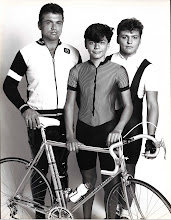The bike’s getting lots of attention and a general sense of
anticipation for the arrival of the season's opening classic is
beginning to spread around the early morning customers in
the cafes and bars on the beach front. Italians have a great
sense of tradition, and having married into an Italian family
I've realized that this is based on the misconception that
everything was always better in the good old days, not leas
t the world of bike racing, as I'm constantly reminded by my
Father in law.
In "his" day (anywhere from 1920 to 1970) races were
In "his" day (anywhere from 1920 to 1970) races were
longer, riders were tougher, hills steeper, bikes heavier etc.
etc... yet some how things were always a lot better,
especially when it came to the golden era of Coppi and
Bartoli. Now far be it for me to dispute these non-scientifically
proven, rose tinted views held by the older generation, but on
a day like today with the race expected to arrive in about 7
hours and the current golden era of Italian cycling spearheaded
by Petacchi, Bettini, (and even Basso and Cunego for the
Grand
Tours) on its way, I can't help but think with all due respect,
these old guys just don't know what the F@ck they're talking
about. But that's the point in Italy – everyone’s got a view
on this race and that's why I've always wanted to get under
the skin of this legendary classic and find out why it means
so much to have a win at San Remo on your palmares.
It's said that if you win San Remo you'll never have to pay fo
It's said that if you win San Remo you'll never have to pay fo
r a drink in an Italian bar for the rest of your life. But what's
not said too often is that with all the bar room philosophers
around you'll wish you'd done as Zabel did last year, and put
your hands up a bit earlier to avoid dying of boredom. All of
the greats have won here Coppi, Merckx, Gimondi, Kelly,
Marc Gomez (I know, it was 1982 a bit freaky, but some
where an Italian will have a view on him - )




No comments:
Post a Comment